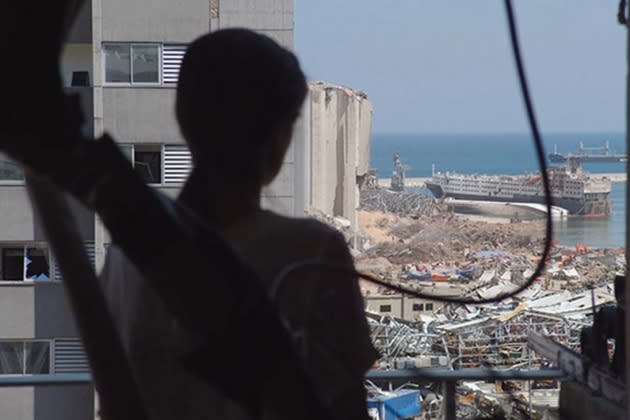‘Dancing on the Edge of a Volcano’ Review: A Fascinating Real-Life Account of a Film Shoot Fraught With Setbacks

Leave it to a film production company to make the best of a bad situation. At least cinematically, that is. In 2020, the Beirut-based Abbout Productions was in pre-production on a film called Costa Brava, Lebanon when the city was rocked by a devastating explosion at the Port of Beirut that decimated much of the area. Cyril Aris’ documentary, world-premiering at Karlovy Vary, chronicles the production team’s determined efforts to go ahead with the film despite a plethora of obstacles. Not only did they have to deal with catastrophic damage to homes and offices, but also the pandemic, fuel shortages and a currency in free fall. Dancing on the Edge of a Volcano compellingly tells the story of filmmaking by fire.
Beirut, of course, is a place that has seen more than its share of travails, as the opening footage of the city in ruins in 1980 during the Lebanese Civil War illustrates. It was rocked again by the 2020 catastrophe, the result of 2,700 tons of ammonium nitrate being recklessly stored in a warehouse.
More from The Hollywood Reporter
“This is the soundtrack of the last two weeks,” says cinematographer Joe Saade, referring to the sound of broken glass on his balcony as he attempts to water his plants. “On the bright side, I have a breeze!” he jokes. On the darker side, he lost the sight in one eye, which he admits is ironic for a director of cinematography.
The company’s offices were severely damaged but fortunately were spared any looting. “Thank god no one cares about film,” someone dryly points out about the undisturbed cans of film on the premises.
The company members’ despair emerges during a production meeting when one woman exclaims, “Why the hell are we still in this country? I can’t take it!” At another point, one of the child actresses cast in the film tenderly comforts a crying staffer whose friend was killed in the explosion.
Costa Brava, Lebanon, directed by Mounia Akl, is about a family who leaves Beirut and takes refuge in a makeshift home in the mountains, only to learn shortly after that the government plans to build a garbage landfall right next door. The film’s themes of government corruption and despoilment were made all the more resonant by the disastrous explosion that threatened to prevent its making.
Despite the tremendous obstacles involved, the filmmakers didn’t lose their sense of humor. “I feel like I’m in Lost in La Mancha,” one of them jokes, referring to the documentary about Terry Gilliam’s laborious efforts to make his film adaptation of Don Quixote. “But my husband says I’m in Apocalypse Now.”
The film’s lead actor, Saleh Bakri, had to take a circuitous route from his native Palestine to Lebanon because of Covid restrictions. He films himself at various stages of his journey, berating the “Zionists” for their repressive dictates. When he finally arrives in Beirut, production is delayed once again because the twin child actresses playing his daughter have tested positive. Then, a torrential rainstorm floods the set.
Even the film’s post-production was hampered by a series of significant problems, including a fuel shortage that resulted in the government shutting off power during long stretches of each day.
“Beirut’s appeal lies in its chaos,” one of the people working on the film comments. “It’s famous for it.”
Fortunately, Dancing on the Edge of a Volcano (the title stems from a phrase originally used to describe Weimar-era Germany) has a happy ending. We see footage of the cast and crew celebrating the premiere of Costa Brava, Lebanon at the Venice Film Festival, where it received critical acclaim. It seems inevitable that both films will have a future life as a double feature at repertory theaters.
Best of The Hollywood Reporter
Natalie Portman at Cannes: "I Need to Leave the Drama for the Screen"
Ailing ‘Superman’ Star Valerie Perrine Finally Finds Her Hero: "The Guy Should Be Sainted"

